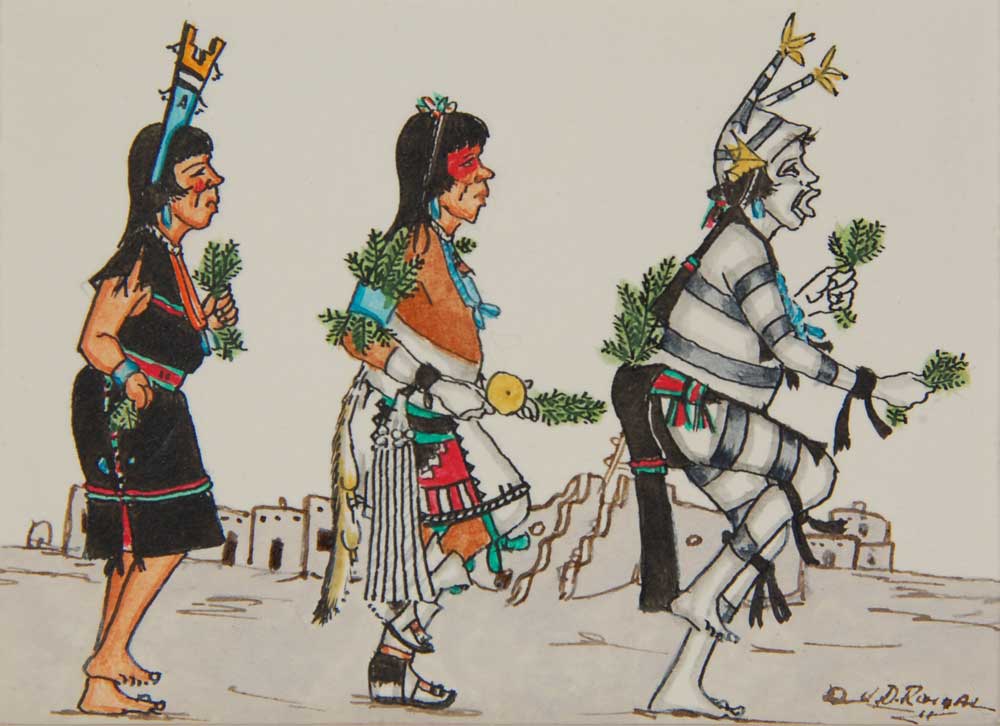Friday
As today is the beginning of the holiday shopping season, it’s good to remind ourselves to resist consumerism and focus on what is truly important. We give gifts at the darkest time of year to affirm our belief that life is bountiful, even though the dark, cold days indicate otherwise. Judaism, Hinduism, Buddhism, and Christianity all have their festivals of light, another way of affirming this belief.
Gift-giving can descend into crass materialism, however. As I am currently teaching Leslie Marmon Silko’s Ceremony, here’s a story from the novel about what happens when people become distracted by flash and glitter and neglect their spiritual roots.
One of many old Pueblo tales that appear in Ceremony, this one is about a conman who comes into town and impresses everyone with his magic. The people become so mesmerized by him that they neglect Mother Corn, who angrily packs up and leaves. The wasteland drought that follows is Silko’s metaphor for both the spiritual and the environmental devastation that results when a culture forgets what is most important.
Throughout Ceremony, Silko applies the old tales to current developments. In this case, the conman’s magic is white people’s technology, which so dazzles the Indians that they forget about the deep wisdom to be found in their age-old customs. As the wise old Josiah says to the book’s protagonist before telling him the story,
“[T]here are some things worth more than money.” He pointed his chin at the springs and around the narrow canyon. “This is where we come from, see. This sand, this stone, these trees, the vines, all the wildflowers. This earth keeps us going.” He took off his hat and wiped his forehead on his shirt. “These dry years you hear some people complaining, you know, about the dust and the wind, and how dry it is. But the wind and the dust, they are part of life too, like the sun and the sky. You don’t swear at them. It’s people, see. They’re the ones. The old people used to say that droughts happen when people forget, when people misbehave.”
In the upcoming holy-day season, we too must remain mindful of our mother corn altar. We must not forget the god or spirit or belief system that grounds our lives. Telling our age-old stories, including the one about a god who was born in humble circumstances two thousand years ago, is a way of doing this.
Here’s Silko’s story:
One time
Old Woman K’yo’s
son came in
from Reedleaf town
up north.
His name was Pa’caya’nyi
and he didn’t know who his ather was.
He asked the people
“You people want to learn some magic?”
and the people said
“Yes, we cn always use some.”
Ma’see’wi and Ou’yu’ye’wi
the twin brothers
were caring for the mother corn altar,
but they got interested in this magic too.
“What kind of medicine man
are you,
anyway?” they asked him
“A Ck’o’yo medicine man,”
he said.
“Tonight we’ll see
if you really have magical power,” they told him.
So that night
Pa’caya’nyi
came with his mountain lion.
He undressed
he painted his body
the whorls of flesh
the soles of his feet
the palm of his hands
the top of his head.
He wore feathers
on each side of his head.
He made an altar
with cactus spines
and purple locoweed flowers.
He lighted four cactus torches at each corner.
He made the mountain lion lie
down in front and
then he was ready for his magic.
He struck the middle of the north wall
He took a piece of flint and
he struck the middle of the north wall.
Water poured out of the wall
and flowed down
toward the south.
He said “What does that look like?
Is that magic power?”
He struck the middle of the west wall
and from the east wall
a bear came out.
“What do you call this?”
he said again.
“Yes, it looks like magic all right,”
Ma’see’wi said.
So it was finished
and Ma’see’wi and Ou’yu’ye’wi
and all the people were fooled by
that Ck’oo’yol medicine man,
Pa’caya’nyi.
From that time on
they were
so busy
playing around with that
Ck’o’yo magic
they neglected the mother corn altar.
They thought they didn’t have to worry
about anything
They thought this magic
could give life to plants
and animals.
They didn’t know it was all just a trick.
Our mother
Nau’ts’ity’i
was very angry
over this
over the way
all of them
even Ma’see’wi and Ou’yu’ye’wi
fooled around with this
magic.
“I’ve had enough of that,”
she said,
If they like that magic so much
let them live off it.”
So she took
the plants and grass from them.
No baby animals were born.
She took the
rainclouds with her
Keep in mind that, to keep the Mother happy, all we need to do is honor her. It doesn’t even cost any money.


